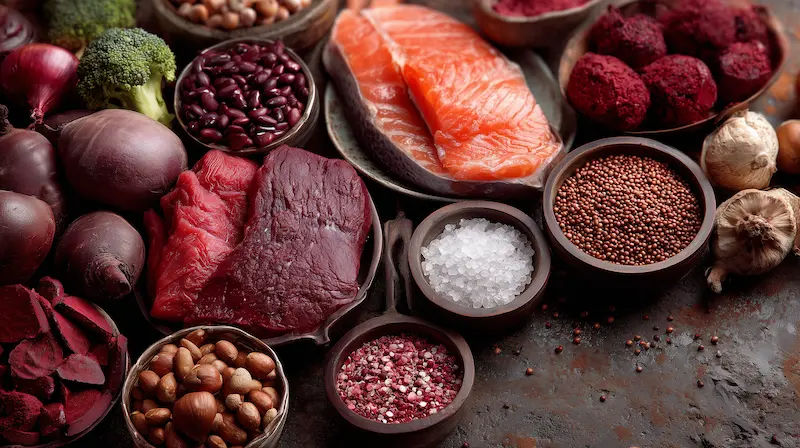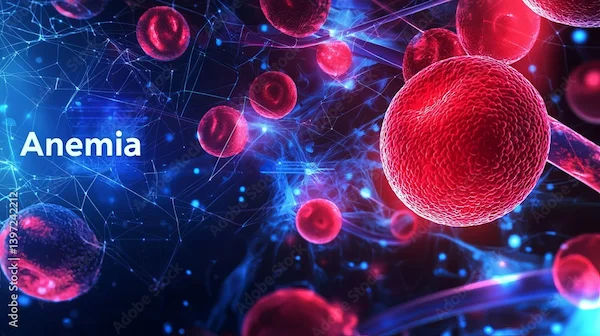Feeling Tired? Uncovering the Root Causes of Anaemia
Feeling constantly tired or pale? Learn the common signs of anaemia, its root causes—from iron and vitamin deficiencies to chronic conditions—and when to seek medical advice.

Written by Dr. J T Hema Pratima
Reviewed by Dr. Dhankecha Mayank Dineshbhai MBBS
Last updated on 13th Jan, 2026

Introduction
Do you feel constantly tired, no matter how much you sleep? Do you find yourself getting winded climbing a short flight of stairs or noticing an unusual paleness in your skin? These common complaints are often brushed off as symptoms of a busy life, but they could be your body's way of signalling an underlying health issue: anaemia. Anaemia is a condition that develops when your blood lacks enough healthy red blood cells or haemoglobin, the substance that allows them to carry oxygen. When your tissues and organs don't get the oxygen they need, it leads to that hallmark feeling of fatigue and a host of other symptoms. This article will serve as your guide to understanding not just the signs of anaemia, but, more importantly, what leads to them. We will explore the various types of anaemia, from the common iron-deficiency to more complex forms, helping you understand the root causes behind your symptoms and when it might be time to seek professional advice.
What is Anaemia, Really? A Quick Biology Lesson
At its core, anaemia is not a disease itself but a symptom of an underlying problem. To understand what leads to the signs of anaemia, we must first understand the role of red blood cells. Think of these cells as tiny delivery trucks traveling through your bloodstream. Their cargo is oxygen, picked up from your lungs and delivered to every part of your body—from your brain to your muscles.
The Vital Role of Red Blood Cells and Haemoglobin
The key component inside each red blood cell is haemoglobin, an iron-rich protein that actually binds to oxygen. The amount of haemoglobin in your blood directly determines its oxygen-carrying capacity. Anaemia occurs when:
- Your body doesn't make enough red blood cells.
- Bleeding causes you to lose red blood cells faster than they can be replaced.
- Your body destroys red blood cells prematurely.
When any of these things happen, your "delivery fleet" shrinks or becomes inefficient, leading to an oxygen shortage that manifests as the symptoms we commonly associate with anaemia.
Consult a Haematologist for the best advice
The Common Thread: Recognising the General Signs of Anaemia
The signs of anaemia can be subtle at first, often mistaken for general stress or lack of sleep. However, as the condition progresses, they become more pronounced.
Fatigue and Weakness: The Hallmark Symptom
This is the most common symptom. It’s not just ordinary tiredness; it’s a persistent lack of energy that interferes with daily activities. Your body is essentially running on empty because it’s not getting enough oxygen to produce energy.
Pale Skin and Brittle Nails: External Clues
Haemoglobin gives blood its red color, which in turn gives your skin its rosy hue. With low haemoglobin levels, skin can become pale. Inside the lower eyelid (the conjunctiva) is a common place for doctors to check for pallor. Brittle nails or nails that curve inward (a condition called koilonychia) can be a specific sign of long-term iron deficiency.
Shortness of Breath and Heart Palpitations
When oxygen is scarce, your body tries to compensate. Your breathing rate increases to grab more oxygen from the air (shortness of breath), and your heart has to work harder to pump the oxygen-depleted blood around your body, which can lead to a feeling of a racing, pounding, or irregular heartbeat (heart palpitations).
Unusual Cravings and Cognitive Fog
Some people with iron deficiency develop pica, a craving for non-nutritional substances like ice, dirt, or clay. Additionally, an oxygen-starved brain can lead to dizziness, headaches, and difficulty concentrating, often described as "brain fog."
The Main Culprits: A Deep Dive into the Causes of Anaemia
Understanding the type of anaemia is crucial because it dictates the treatment. The causes are diverse, ranging from nutritional deficiencies to chronic diseases.
Iron-Deficiency Anaemia: The Most Common Type
This is the leading cause of anaemia worldwide. Without sufficient iron, your body can't produce enough haemoglobin. The causes of low haemoglobin in this case are twofold: loss of iron or inadequate intake.
Causes of Iron Loss: Heavy Periods and Bleeding
The most common cause in premenopausal women is blood loss from heavy menstrual periods. Other sources of slow, chronic blood loss include peptic ulcers, hiatal hernias, colon polyps, or colorectal cancer. Regular use of over-the-counter pain relievers like aspirin can also cause stomach bleeding.
Causes of Low Iron Intake: Diet and Absorption Issues
Even without blood loss, you can develop a deficiency if your diet lacks iron-rich foods (like red meat, leafy greens, and fortified cereals). Certain conditions like celiac disease or Crohn's disease can impair your intestine's ability to absorb iron from food, leading to symptoms of iron deficiency anaemia.
Vitamin-Deficiency Anaemias (Megaloblastic Anaemias)
Your body needs Vitamin B12 and Folate (Vitamin B9) to produce healthy red blood cells. A shortage of these vitamins can lead to poorly formed, large red blood cells that don't function properly.
Vitamin B12 Deficiency: Beyond Diet
While a diet lacking in animal products (meat, dairy, eggs) can cause B12 deficiency, a more common cause is pernicious anaemia—an autoimmune condition where the body attacks the stomach cells that produce a protein called "intrinsic factor," which is essential for B12 absorption.
Folate (Vitamin B9) Deficiency
Folate is found in leafy green vegetables and fruits. Deficiency can occur from a poor diet, excessive alcohol consumption, or certain medications. It's especially critical during pregnancy for foetal development.
Anaemia of Chronic Disease
Chronic inflammatory diseases—such as rheumatoid arthritis, Crohn's disease, kidney disease, or cancer—can interfere with the body's ability to use iron to make new red blood cells, even if iron stores are normal. This is one of the most common types of anaemia in hospitalised individuals.
Aplastic Anaemia: When Production Shuts Down
This is a rare but serious condition where the bone marrow fails to produce enough of all blood cells, including red blood cells. It can be caused by infections, autoimmune diseases, exposure to toxic chemicals, or certain medications.
Haemolytic Anaemias: When Red Cells Die Too Fast
This group of anaemias occurs when red blood cells are destroyed faster than the bone marrow can replace them. It can be inherited (like sickle cell anaemia or thalassemia) or acquired later in life due to infections, autoimmune attacks, or mechanical heart valves damaging the cells.
Anaemias Linked to Bone Marrow Disease
Conditions like leukaemia and myelofibrosis can affect blood production in the bone marrow, leading to anaemia and other blood abnormalities.
Who is Most at Risk? Key Risk Factors for Anaemia
Certain factors increase your likelihood of developing anaemia:
- A Diet Lacking in Vitamins: Vegetarians and vegans who don't supplement may be at risk for B12 deficiency.
- Menstruating Women: Due to monthly blood loss.
- Pregnant Women: Because of increased iron demands for the growing foetus.
- Chronic Conditions: Such as kidney disease or cancer.
- Family History: Of inherited anaemias like sickle cell.
- Age: People over 65 are at higher risk.
How is Anaemia Diagnosed? The Path to Confirmation
If you're experiencing signs of anaemia, a simple blood test is the first step. If your condition does not improve after trying dietary changes, consult a doctor online with Apollo24|7 for further evaluation.
The Complete Blood Count (CBC) Test
This is the primary test. It measures several components of your blood, including:
- Haemoglobin: Low levels indicate anaemia.
- Haematocrit: The percentage of your blood volume made up by red blood cells.
- Red Blood Cell Count: The number of red blood cells.
Additional Tests to Pinpoint the Cause
If the CBC confirms anaemia, further tests can identify the type:
- Ferritin Test: Measures your body's iron stores.
- Vitamin B12 and Folate Levels: Checks for vitamin deficiencies.
- Peripheral Blood Smear: Examines the size and shape of your red blood cells.
Apollo24|7 offers convenient home collection for tests like CBC, ferritin, or vitamin panels, making the diagnostic process easier.
Get Your Health Assessed
Conclusion
Recognising the signs of anaemia is the first step toward reclaiming your energy and well-being. While fatigue is common, its persistence, especially when coupled with other symptoms like paleness or heart palpitations, should not be ignored. Understanding what leads to signs of anaemia empowers you to have a more informed conversation with your healthcare provider. Whether the root cause is a simple nutritional gap or a more complex chronic condition, effective treatments are available. The journey to better health begins with listening to your body and taking action. If you suspect you might be anaemic, don't hesitate to seek medical advice. If symptoms persist beyond two weeks, consult a doctor online with Apollo24|7 for further evaluation. A proper diagnosis is the key to finding the right solution and getting back to feeling like yourself again.
Consult a Haematologist for the best advice
Get Your Health Assessed
₹419(₹1047)60% off
₹209(₹522)60% off
₹320(₹800)60% off
₹90(₹225)60% off
₹1049(₹2622)60% off
₹1489(₹3723)60% off
Consult a Haematologist for the best advice

Dr.sanchayan Mandal
Medical Oncologist
17 Years • MBBS, DrNB( MEDICAL ONCOLOGY), DNB (RADIOTHERAPY),ECMO. PDCR. ASCO
Kolkata
Dr. Sanchayan Mandal Oncology Clinic, Kolkata

Dr. Thorana Prakash M
General Physician
2 Years • MBBS
Bengaluru
PRESTIGE SHANTHINIKETAN - SOCIETY CLINIC, Bengaluru

Dr. Sushith C
General Physician
2 Years • MBBS
Bengaluru
PRESTIGE SHANTHINIKETAN - SOCIETY CLINIC, Bengaluru

Dr. Ramalinga Reddy
General Physician
5 Years • MBBS MD General medicine
Bengaluru
PRESTIGE SHANTHINIKETAN - SOCIETY CLINIC, Bengaluru

Dr. Niharendu Ghara
Paediatric Haematologist
20 Years • MBBS - Calcutta University , DCH- Calcutta University , MD Pathology - AllMS, New Delhi , MRCPCH- Royal College of Paediatrics & Child Health, UK , FRCPath (Haematology) - Royal College of Pathologists, UK , CCT (Haematology)- UK
Kolkata
Apollo Multispeciality Hospitals , Kolkata, Kolkata
Consult a Haematologist for the best advice

Dr.sanchayan Mandal
Medical Oncologist
17 Years • MBBS, DrNB( MEDICAL ONCOLOGY), DNB (RADIOTHERAPY),ECMO. PDCR. ASCO
Kolkata
Dr. Sanchayan Mandal Oncology Clinic, Kolkata

Dr. Thorana Prakash M
General Physician
2 Years • MBBS
Bengaluru
PRESTIGE SHANTHINIKETAN - SOCIETY CLINIC, Bengaluru

Dr. Sushith C
General Physician
2 Years • MBBS
Bengaluru
PRESTIGE SHANTHINIKETAN - SOCIETY CLINIC, Bengaluru

Dr. Ramalinga Reddy
General Physician
5 Years • MBBS MD General medicine
Bengaluru
PRESTIGE SHANTHINIKETAN - SOCIETY CLINIC, Bengaluru

Dr. Niharendu Ghara
Paediatric Haematologist
20 Years • MBBS - Calcutta University , DCH- Calcutta University , MD Pathology - AllMS, New Delhi , MRCPCH- Royal College of Paediatrics & Child Health, UK , FRCPath (Haematology) - Royal College of Pathologists, UK , CCT (Haematology)- UK
Kolkata
Apollo Multispeciality Hospitals , Kolkata, Kolkata
More articles from Anemia
Frequently Asked Questions
Can stress cause anaemia?
While stress itself doesn't directly cause anaemia, chronic stress can lead to behaviours that contribute to it, such as poor dietary choices or developing stress-induced gastritis, which can cause stomach bleeding. Furthermore, the 'anaemia of chronic disease' can be triggered by the inflammatory response associated with long-term stress.
What's the difference between iron deficiency and anaemia?
Iron deficiency is a state where your body's iron stores are low. Anaemia is the advanced stage of iron deficiency where the lack of iron has become severe enough to reduce your red blood cell and haemoglobin production. You can be iron deficient without yet being anaemic.
What are the signs of B12 deficiency anaemia?
In addition to common anaemia symptoms like fatigue, B12 deficiency can cause neurological symptoms. These include numbness or tingling in the hands and feet, muscle weakness, difficulty walking, memory loss, and confusion.
How quickly can anaemia be corrected?
It depends on the cause and treatment. With iron supplementation for iron-deficiency anaemia, you might start feeling better within a week, but it can take several months to fully replenish iron stores. For other types, the timeline varies.
Are there specific foods to avoid if you are anaemic?
Some substances can inhibit iron absorption. It's best to avoid drinking coffee, tea, or calcium-rich foods (like milk) at the same time as you take iron supplements or eat iron-rich meals. Instead, pair iron-rich foods with vitamin C (like orange juice) to enhance absorption.


.webp)



